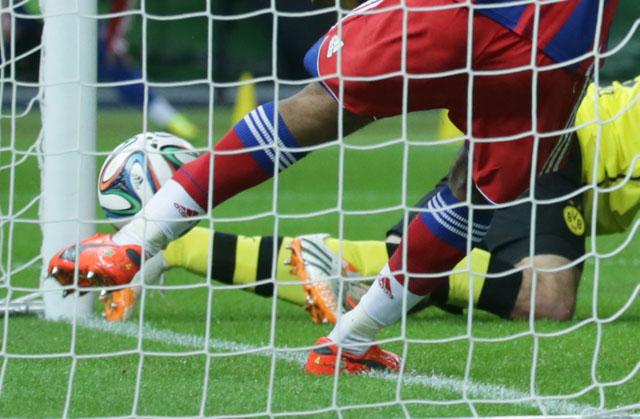You are here
Football gets technology makeover for World Cup
By AP - Jun 01,2014 - Last updated at Jun 01,2014
BERLIN –– It’s a debate that has been raging for nearly 50 years.
Did Geoff Hurst’s decisive goal for England in the 1966 World Cup final against West Germany really cross the line after the ball bounced down off the crossbar?
A definitive answer will never be established — and whether Germany likes it or not, England can never be denied its one and only world title. Thankfully, though, arguments over goal line incidents at World Cups should now be consigned to the past.
For the first time on football’s biggest stage, technology will be used to determine whether a ball crosses the goal line during matches at the upcoming tournament in Brazil.
A system developed by little-known German company GoalControl uses 14 cameras — seven trained on each goalmouth — that are mounted on the roof of the stadium and can capture the three-dimensional position of the ball with high precision. When the whole of the ball passes the goal line, a vibration and optical signal is sent to a watch worn by the referee in less than one second, indicating that a goal should be awarded.
With vanishing spray also being used to prevent encroachment by defenders making up a wall during free kicks, officials at the highest level of the world’s most popular sport are finally getting some assistance, just like they do in tennis, cricket, baseball, American football and many other sports.
“Our main feeling is anticipation,” Dirk Broichhausen, managing director of GoalControl, told The Associated Press. “The technology is mature and we are absolutely convinced of the system’s reliability. The World Cup is the biggest chance to showcase in football — it will put goal-line technology worldwide in the centre of interest.”
The clamor for technology reached its peak at the last World Cup in South Africa in 2010 — and again because of an incident in a match between old foes England and Germany.
England midfielder Frank Lampard had a clear goal disallowed because officials failed to see that the ball had bounced down off the bar and well over the line. The score at the time was 2-1 to Germany, which went on to win the last-16 match 4-1.
Sepp Blatter, president of world football’s governing body FIFA, said it took him a day to come to terms with the incident.
“It is obvious that after the experiences so far at this [2010] World Cup, it would be a nonsense not to reopen the file on goal-line technology,” he said.
The sport’s rule-making body, the International Football Association Board, took the historic decision in 2012 to allow computer-assisted decisions in FIFA tournaments. GoalControl was selected, somewhat surprisingly given that it was up against the more universally known Hawk-Eye, which provided goal-line technology systems for the first time in last season’s English Premier League.
GoalControl operated without a glitch at last year’s Confederations Cup — a warm-up competition for the World Cup — and at the Club World Cup.
“Goal-line technology will become a permanent part of football in all major football leagues, I’m firmly convinced of it,” Broichhausen said in an e-mail. “The camera-based system opens a lot of possibilities for analytics and entertainment solutions in football as well as supporting the rules, for example to clarify offside.”
Blatter is against extending the use of technology so that it can rule on matters such as offside and penalties. Then again, football’s supremo wasn’t in favour of vanishing spray a couple of years ago, only to change his mind in December.
Related Articles
Was it a goal, or wasn’t it? The question shouldn’t need to be debated in the next five weeks in Brazil, where goal-line technology will be used for the first time in a World Cup.
Faced with football’s “biggest decision ever”, FIFA said on Saturday it would not be rushed into approving — or even testing — video technology to improve the accuracy of referees’ decisions.
Goalline technology moved back into the spotlight in Germany after a controversial decision in the German Cup final between Bayern Munich and Borussia Dortmund on Saturday, less than two months after its introduction was rejected by the league.

















